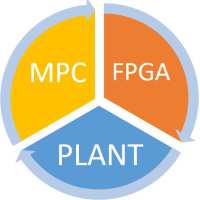Optimal Co-design of FPGA Implementations for MPC
 Model Predictive Control (MPC) is a powerful control technique, which employs a mathematical description of the plant in order to derive an appropriate control signal. Calculation of the optimal input sequence produced by an MPC controller is a computationally costly operation that has to be performed every sampling instance. For this reason MPC approach is conventionally used for relatively slow dynamic plants, for example in chemical and petrochemical applications. Recent developments in sensing and actuation technologies, communication networks and hardware processing systems has increased potential application scope of MPC. However, significant speed improvements are still required to widen the range of applications of MPC.
Model Predictive Control (MPC) is a powerful control technique, which employs a mathematical description of the plant in order to derive an appropriate control signal. Calculation of the optimal input sequence produced by an MPC controller is a computationally costly operation that has to be performed every sampling instance. For this reason MPC approach is conventionally used for relatively slow dynamic plants, for example in chemical and petrochemical applications. Recent developments in sensing and actuation technologies, communication networks and hardware processing systems has increased potential application scope of MPC. However, significant speed improvements are still required to widen the range of applications of MPC.
To achieve the best performance of the control system both an MPC algorithm and hardware architecture have to be taken into account. Field-programmable gate array (FPGA) is the most flexible type of embedded hardware platforms and therefore extensively used for predictive control applications. Conventional implementation strategies propose manual tuning of co-design optimization variables to find optimal solution, in terms of computation speed, consumed energy and used space. To automate the design process complex discrete optimization problem has to be specified and solved. Such optimization problem may involve plenty of variables: parallelization level, pipeline depth, number of bits for data representation, type of solver, matrices density and even algorithm type.
The main goal of this Ph.D. project is to make a reasonable step towards automation of the entire multidisciplinary co-design process. It should be emphasized that in this project co-design will be considered from two points of view. On the one hand, computation speed, energy and space will be improved by automatically fitting the MPC algorithm on FPGA chip in an optimal way by solving an offline optimization problem. On the other hand, the performance of the whole cyber-physical system will be enhanced by employing an integrated approach for control system and plant design.
CAP People
- Dr Eric Kerrigan, e.kerrigan@imperial.ac.uk
- Bulat Khusainov, b.khusainov@imperial.ac.uk
External
- Prof George Constantinides, g.constantinides@imperial.ac.uk (Head of Circuits and Systems Research Group)


